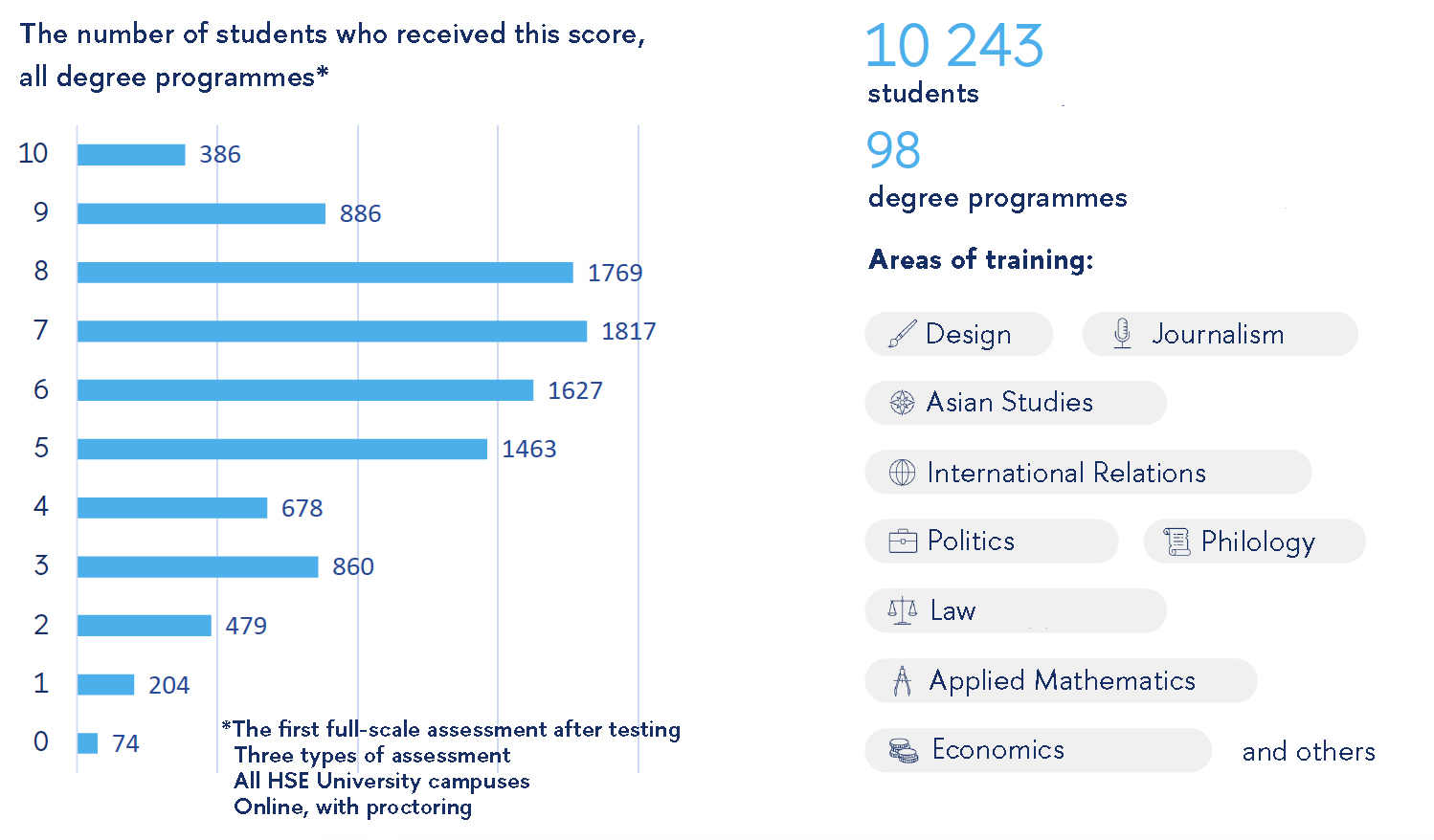More than 10,000 HSE Students Pass Digital Skills Exam

This year, for the first time, all first-year students took independent exams as part of the university-wide Data Culture project. These exams checked the level of digital literacy, algorithmic thinking and programming, as well as data analysis and artificial intelligence skills. HSE students and Head of the Data Culture project Olga Podolskaya spoke about the exams and preparation process.
The HSE's university-wide Data Culture project is a comprehensive system of more than 150 courses focused on different levels of digital skills (elementary, basic, advanced) for undergraduate programmes, advanced training courses for teachers and a mandatory independent exam that allows each student to check the level of their digital skills.
This year, all first-year students took these independent exams for the first time. The exam had undergone several stages of testing, but this year was the first full-scale experience for both students and the Data Culture team. In the 3rd and 4th modules, students of 86 degree programmes (77 of them are implemented in Russian and 9 - in English) took exams. Olga Podolskaya, Head of the Data Culture project, spoke to us about the final results of the exams of the 2021/22 academic year.

Olga Podolskaya, Head of the Data Culture project
‘In total, more than 10,000 students took exams on digital literacy and programming at elementary and basic levels and data analysis at an elementary level. We prepared special tasks for students with disabilities that allow us to evaluate the level of digital skills in a form accessible to the students. The analysis of the results showed a normal distribution of results, which indicates the quality of the measuring tool.’
She added that next year they plan to develop the exam further. and integrate it into the educational process. They also discuss the possibility of crediting the results of an independent exam for previous mandatory courses and the option of proactively assessing digital skills without the need to study a course.

Independent exams at HSE University are held entirely online using a proctoring procedure. The Data Culture team includes not only methodologists and teachers, but also HSE students. Ainur Sharipov, a student on the bachelor’s programme in ‘Software Engineering’, has developed a unique plugin for a system that evaluates the practical part of the digital literacy exam so that the results are processed automatically. These plugins were introduced onto HSE online platforms and used for independent work and exams, including the independent digital literacy exam.
Ainur Sharipov
‘During my second year our teacher Nikolay Chuykin offered me a term paper topic: to create a tool for checking students' assignments on digital literacy. Then we decided to implement the tool in HSE’s online educational platforms and to create a Moodle plugin.
As developer, I was in close contact not only with the customer, the Data Culture team, but also with direct plugin users - students and task authors. The plugin has been tested extensively, I worked on the creation, configuration and task debugging. When errors or limitations occurred, I received feedback and proposed and coordinated solutions with the manager, then implemented them, adapting the programme functions and requirements. Thus I tried to create a clear, intuitive and flexible product that meets the customers’ needs.’
The independent Digital Skills exam is not only a knowledge testing tool. Supported by the Data Culture courses, it is part of a unique integrated product that allows both the assessment and teaching of digital skills. The course and exam concept is constantly evolving: this year a team of methodologists and developers has been actively working on customising and personalising both courses for the Data Culture project and tasks for the independent exam.
Polina Pashchenko, student of the bachelor’s programme ‘Urban Planning’ says that she took the course ‘Digital Literacy’ in the 4th module of her first year. The theory built from simple to complex, then students implemented tasks related to their future specialisation.
Polina Pashchenko
‘This course provides basic knowledge necessary for both work and study for all students. First of all, it will be useful to the students who haven’t yet mastered basic Office programmes, since using these skills while studying helps to plan and use their time more efficiently.’
Digital skills are becoming an increasingly important part of all degree programmes, not only those in IT, but also in the humanities, natural sciences and creative disciplines. According to Evgeny Epifanov, a student of the bachelor’s programme in Chemistry, solving problems in Python helps him when researching theoretical chemistry and writing articles.
Evgeny Epifanov
‘Since I work in the theoretical chemistry group of the Institute of Organic Chemistry of the Russian Academy of Sciences, it was important for me to create code that would help me in my research when I worked on the Python course project. Being engaged in theoretical chemistry, I often use programming in the process of writing research articles.’
A special feature of this year's independent digital skills exam was also the opportunity for students to test their level using the digital skills model developed by Innopolis University. HSE students were asked to compare the results of the internal exam with those from external testing and 1,622 HSE students took part in this experiment. The matrix of digital skills of the Innopolis model is close to the structure that HSE University chose at the start of the Data Culture project: it has the principles of algorithmisation, using programming languages for solving professional tasks and database management.
The Innopolis assessment scale includes four levels, as opposed to the three at HSE University: elementary, basic, advanced, expert. According to the testing, 79% of those who passed the exam reached advanced level according to three testing indicators, 11% — basic, 9% — expert and only 1% — the elementary level. This year, students with good results can choose which of the results to add to their individual credit scores.
Over the past few years, new requirements for professional standards have been actively developed, affecting degree programmes at universities. Since 2018, the ‘Personnel for the Digital Economy’ federal project has been implemented, and the main purpose of this project is to ensure mass digital literacy and to develop key digital skills. The Data Culture project was launched in 2017. It covers all bachelor's programmes and represents an integral part of preparing every HSE student for the new digital reality.

Sergey Roshchin, HSE University Vice Rector
'A key part of the digital maturity of the economic sectors is personnel whose knowledge and skills are closely intertwined with the instrumental digital knowledge necessary to overcome the challenges of the modern world. Data Culture represents cross-cutting skills acquired by all HSE students at different levels, regardless of their field of study.’
Sergey Roshchin
HSE University Vice Rector
Nikolay Chuykin
Senior Lecturer, School of Software Engineering
See also:
Data Culture: New Times Require New Solutions
The Data Culture Project, a module of the educational programme at HSE University, was launched seven years ago. At that time, it was already clear that the ability to work with data had become an essential skill for any professional, regardless of their field. Thousands of students have since participated in the project's courses, and now it has expanded to all HSE campuses. In 2024, a total of 26,903 students passed independent exams on digital skills. Several updates to the course are planned for the upcoming academic year. In this article, we discuss the changes expected for the Data Culture Project.
Data Culture: HSE Will Teach All Its Students to Work with Data
HSE will launch a new project called Data Culture in September 2017. Starting their very first year, HSE bachelor’s students will learn to work with data, and students in a number of programmes will also become familiarised with methods of machine-learning and artificial intelligence.


